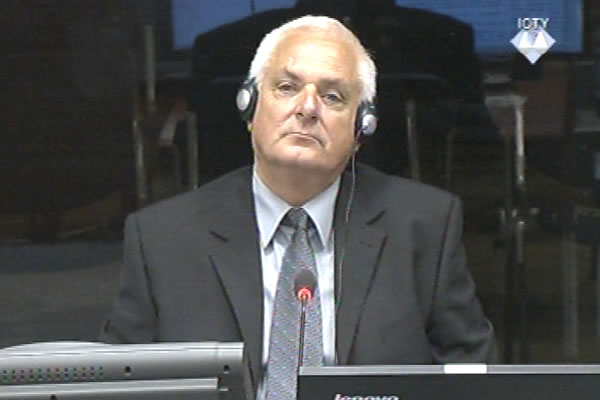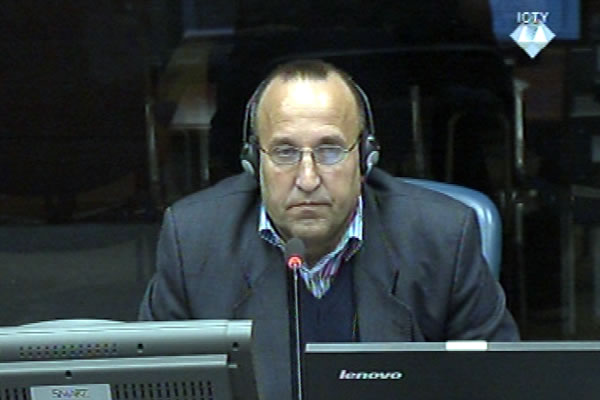Home
RHYME DID NOT WORK FOR EVERYONE
Three of Mladic’s defense witnesses have insisted that Foca was not renamed Srbinje in order to highlight the absolute Serb majority in the town but in order to make it rhyme with the neighboring municipalities of Nevesinje, Ljubinje and Trebinje. This prompted the presiding judge to ask why after the war the old name was reinstated at the Muslim request. ‘Should not a good rhyme work for everyone?’, the presiding judge asked
 Trivko Pljevaljcic, defence witness at Rako Mladic trial
Trivko Pljevaljcic, defence witness at Rako Mladic trial The first fighter killed in Foca was a Serb, the first woman who was raped was a Serb, and the first building that was destroyed was the Serb Orthodox church. That is what former Bosnian Serb soldier Trivko Pljevaljcic claims in his statement to Ratko Mladic’s defense. As the Serb troops responded to the Muslim attack, they captured the town, the witness recounted. According to Pljevaljcic, from then on, the Serb army only defended itself.
The witness denied that Muslims were expelled. On the contrary, Muslims left ‘on their own’, and the Serb authorities merely ‘facilitated their departure’. Before Muslims left, the witness explained, they were provided with temporary accommodation in several locations such as the Partizan sports hall and the Correctional and Penal Facility (KPD). The witness claimed he didn’t know anything about the abuse and killing of Muslims in those prison facilities despite the fact that at one point he worked in the KPD. The Tribunal’s judgment in the case against the prison warden Milorad Krnojelac established that the witness’s brother beat the prisoners.
Mladic’s defense witnesses from Foca for the most part have tried to shift the blame for the crimes against Muslims on paramilitary groups. This prompted prosecutor Jeremy to present several documents today, showing that Radovan Stankovic, Radomir Kovac, Zoran Vukovic and Dragoljub Kunarac – rapists from Foca who were convicted by the Tribunal in The Hague and the State Court in Sarajevo – were members of the Republika Srpska regular military units. At first the witness agreed fully with the suggestion. In the re-examination, he tried to correct his testimony and told the defense counsel they ‘wandered’ from unit to unit ‘searching for their identity’.
Pljevaljcic is the third Mladic’s defense witness from Foca to claim that during the war the name of the town was changed to Srbinje to make it rhyme with the neighboring Herzegovina municipalities of Trebinje, Nevesinje and Ljubinje. The town was not renamed to highlight the Serb majority and domination, the witnesses have all argued. After the war, the old name was reinstated at the initiative of the Muslims, who considered Srbinje a show of Serb national feeling. ‘Why should it bother them if it was only done to achieve the rhyme; a good rhyme should work for everyone, shouldn’t it?’, Judge Orie asked rhetorically. The presiding judge asked the witness if he really thought the renaming was done for reasons of ‘poetry’ rather than ethnicity. ‘That’s right, that’s right’, Pljevaljcic replied in a bid to convince the judge.
After Pljevaljcic completed his evidence, the defense called Miladin Mladjenovic, former driver in Vihor, a company in Bratunac. In July 1995, Mladjenovic participated in the transportation of the Srebrenica Muslims. On 12 July 1995, the witness said in his statement to the defense, he drove a ‘batch’ of women, children and the elderly to a place called Tisce. From there, the group traveled on foot to Kladanj. The witness estimated that the next day he drove about 10 batches or about 450 to 500 male detainees from the facility known as the White House in Potocari to the school in Bratunac. As alleged by the prosecution, those prisoners were later executed together with thousands of other captives at the execution sites near Zvornik. The witness claimed that he was unaware of the prisoners’ fate. According to the witness, he could not be bothered to check what had happened to his colleague, a Muslim, whom he had also driven from Potocari to Bratunac. The transports were escorted by two military police officers, and they were met by the civilian police in Bratunac.
At the very end of today’s hearing, Milenko Rajak began his evidence. Rajak was a soldier in the Rogatica Brigade and is the incumbent chairman of the war veterans’ association in Rogatica.
Photos
Linked Reports
- Case : Mladic
- 2014-10-22 DNA ANALYSIS CONTRADICTS SREBRENICA GENOCIDE DENIAL
- 2014-10-21 HOW FOCA BECAME SRBINJE
- 2014-10-20 RESPONSIBILITY OF THE ARMY FOR EXECUTION OF PRISONERS IN RASADNIK FARM
- 2014-10-27 WAR-TIME ASSISTANT DEFENDS MLADIC
- 2014-10-28 LETING HUMANITARIAN CONVOYS THROUGH
- 2014-10-29 MLADIC’S WITNESS: ‘NO ONE STARVED TO DEATH IN WAR IN BH’

